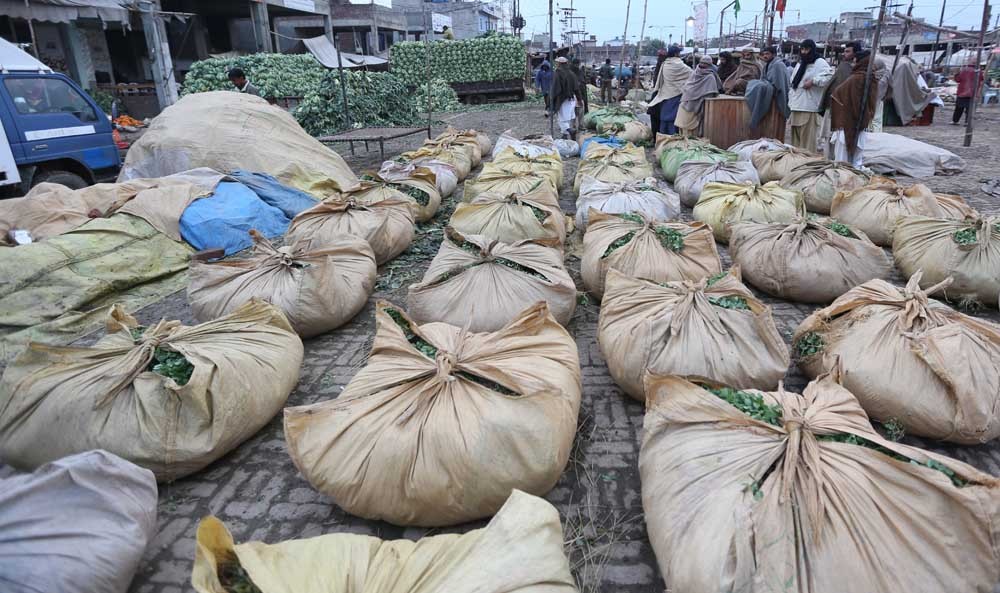
Vegetables grown with sewage water and industrial effluent have been reaching our kitchens for long. Will the PFA efforts to curb this criminal practice achieve the desired results?

Standing close to a donkey cart carrying vegetables on a road, a middle-aged vendor shouts at the top of his voice, beckoning the passersby to inspect what he is selling. He catches hold of an overly sized radish from his pack, and flaunts it to the people who have begun to gather round him. "I can guarantee that you won’t find a similar piece [of vegetable] in the entire market," he announces.
When inquired, the vendor discloses that the produce reached there from the fields in Burki-Hudiara, an area close to the Indo-Pak border at Wagah. The well-known Hudiara Drain that originates from Batala in Gurdaspur district, India, passes through these fields and travels a considerably long distance before falling into the River Ravi.
What this poor man does not tell the people around him is that the water of the said drain is used by farmers in the area to irrigate their lands and grow vegetables. It is quite common to find over-sized vegetables in the local market and a reason for this is that they have far higher concentration of heavy metals like cadmium, chromium, nickel, manganese, zinc, lead etc and other components than acceptable limits. Research studies confirm this phenomenon, terming such agricultural produce as extremely harmful for consumers’ health. Which leads us to the question as to where do these metals and other pollutants come from and enter the food chain? The answer is that the Hudiara Drain brings along municipal and industrial waste dumped into it by housing localities and industries falling on its way.
The farmers in the area use the water for irrigation purposes without realising that its dangerous and toxic components would ultimately enter the crops grown here. This water is less harmful in monsoons because the concentration of metals is low due to rains but in dry periods the situation is totally the opposite.
This practice has been going on for a long time, across Punjab, despite the realisation that the consumption of vegetables thus produced is extremely harmful to our health. In the past, warnings were issued to those practising this; to no effect. Recently, the Punjab Food Authority (PFA) launched a crackdown against this practice and destroyed thousands of maunds of vegetables cultivated with the help of waste water. It also gave a general deadline to the violators to discontinue it.
Khalid Khokhar, President, Pakistan Kissan Ittehad (PKI), says that the farmers opt for this mode of cultivation because in this case the fertiliser is not needed. "Sewage water has components such as ammonia that serves as a fertiliser, though it is un-clean and quite often carries industrial effluent."
Khokhar supports the action taken against the farmers indulging this method of irrigation and suggests the government and concerned departments to ensure that waste water is disposed off only after being treated at the treatment plants. "Going after the violators is good but it would be even better if we could address the core of the issue and stop the disposal of untreated water.
"It’s ironical that vegetables grown with sewage water fetch better prices because of their size. Come to think of it, these are also ‘washed’ with the same water. Vegetables like carrots and radishes, when consumed raw, are most harmful because they carry traces of this toxic on their surface."
The action taken by the PFA has evoked criticism as well; some quarters have even termed it as something out of the domain of their authority. It is believed that the PFA is doing which the departments of environment, agriculture, and irrigation should be doing. Wasting crops is an excess against farmers.
Noorul Amin Mengal, Director General (DG), PFA, dispels the notion, saying that the Authority can act wherever the process of producing edibles is found to be faulty and harmful to public health. "The wastewater is being used as an ingredient which shall not be the case," he tells TNS. "Acting against the culprits [farmers] is very much our domain. We have ordered our officers to map all the areas/locations in the province where waste water is being used for irrigation purposes.
"A deadline has also been set after which a grand operation shall be carried out against the violators."
Mengal says the PFA is faced with strong resistance from the farmers and their supporters, "But the good part is that the chief minister of Punjab has given us a free hand and the support we need."
He also speaks of a "finding that the farmers using waste water for irrigation purposes are not the owners of the land in most cases. They are usually tenants or settlers who opt for this ‘method’ to save investment in tube wells and expensive fertilisers."
Against this backdrop, one can only hope that the drive against the violators goes on in top gear and overcomes whatever resistance it is faced with. In the past, pumps immersed in Hudiara Drain to draw out drain water were removed during the chief ministership of Pervaiz Elahi, but this turned out to be shortlived.
Naseem-ur-Rehman, Director, Environment Protection Department (EPD), does not agree with the fact that the EPD is not doing anything in this regard. "We are coordinating with other departments including the PFA, to check such malpractices," he declares. "Under the Punjab Local Government Ordinance (PLGO), tackling issues like this was the domain of EDO Agriculture but now the responsibility is with the PFA which functions under the provincial government. The EPD can, therefore, only assist but not take action directly."